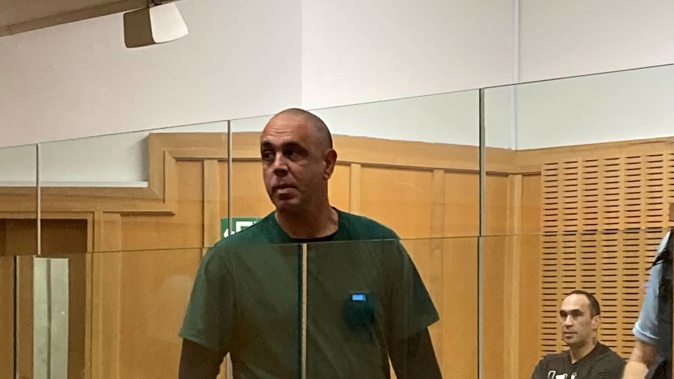

A former Sergeant of Arms of the Waikato Mongrel Mob has been jailed for 10 years for spearheading a commercial drug operation that saw methamphetamine distributed around the country.
Mark Griffiths, 53, will have to serve a minimum of five years in jail before qualifying for parole after being arrested as part of Operation Oakville, the police sting on Griffiths’ group of dealers selling class A and B drugs in Waikato, Auckland, and Wellington.
And while Griffiths’ lawyer Scott Mills told Justice Andru Isac in the High Court at Hamilton today that his client’s association with the gang was now over, Waikato Mongrel Mob president Sonny Fatupaito told NZME the door was still open for him on his release.
Griffiths and Fatupaito, who is known as Fatu, have been vocal about their opposition to drug and alcohol abuse and spoken at several events, or hui, that have also included MPs.
Mills said Fatu had told Griffiths’ section 27 report writer, Dr Jarred Gilbert, that because of his offending, he would now have to leave the group.
However, when questioned by NZME outside court, Fatu said it wasn’t that clear-cut.
“I think he’d be happy for the outcome for him. Life continues. In terms of his association with us well that has to be assessed.
“It’s just based on friendship now.”
Fatu said Griffiths had owned his offending and “taken it on the chin, like he should”.
He first learned Griffiths had been involved in drug dealing when armed offenders squad staff turned up at his home to carry out a search and told him.
“They found nothing... but we’ve gone through about eight police [search] operations in about two years.”
He said it was his family that took Griffiths in as a teenager when he had nowhere else to go.
Excerpts from his section 27 report read to the court showed Griffiths and his siblings were living in their family home when the power was cut for two months.
Violence, drugs and beatings were also a regular feature before he was put into state care, where it continued.
Mills added there was no evidence of “higher living”; they weren’t driving around in Porsches or Ferarris, which was further proof the drugs were for his own use.
Griffiths was the leader while his partner, Sharon Marfell, was described by Justice Andru Isac today as his ”lieutenant” as she travelled around to pick up and on-sell the drugs to other members of the Mongrel Mob, along with her own customers.
As well as selling drugs, she also played a part in collecting money from customers with a drug debt and had three others working for her.
Marfell, who was last year jailed for seven years, and Griffiths were eventually arrested on their way back to their Te Kowhai home from Auckland after picking up 2kg of P on November 12, 2020.
Police waited for them at an off-ramp, and when spotted, the couple fled, throwing a cardboard box containing 124g of meth from the car.
A search of their home uncovered eight one-litre bottles of GBL and two other five-litre bottles with GBL residue.
Sometimes known as “rinse” or “wazz”, GBL is a liquid that makes users feel euphoric but can put them at risk of unconsciousness.
The couple’s financial records were inspected for the period between January 2017 and November 2020 and $713,000 was found to have come from an unknown source.
Crown prosecutor Jacinda Hamilton was quick to front-foot defence submissions whereby Griffiths said the offending was driven by his addiction and suggested it was triggered by the fatal shooting of Robert Nelson inside his Melville house in 2018, that also left his daughter and nephew injured.
But Hamilton said the shooting at his house “was not random, and Mr Griffiths has acknowledged that he was the target”.
“And it is the unfortunate reality that people who choose to involve themselves in this illicit activity... are more likely to become of this type of [shooting].
/cloudfront-ap-southeast-2.images.arcpublishing.com/nzme/NXZNFC3ICJGDVDWBH72T3DSYTI.jpg)
Dannette Vrijs holds a photo of her son, Robert Nelson, the only memory she has after he was shot and killed during a gang shooting in Melville in 2018. Police say he was in the wrong place at the wrong time. Photo / Mike Scott
“The defendant suggests that this offending would not have happened but for that [shooting].
Griffiths had a long history of dealing in methamphetamine and there was no evidence found by police that he was driving his drug operation due to his claimed addiction.
Griffiths’ counsel Mills said the “extraordinary event” re-triggered his addiction.
Those comments have done nothing but infuriate Dannette Vrijs, the heartbroken mother of Nelson, who has still not seen anyone charged over his death.
She was going to head to court to look at Griffiths in the eye but changed her mind at the last minute, worried hearing Griffiths’ “dribble” would set her off.
Vrijs said police had told her they were no longer working her son’s case.
“The politicians, justice system, and the police are a joke.
“I’ve resigned myself to the fact that my son’s case will never be solved as I’m not rich or the right ethnic race, I’m just a heartbroken mum who misses her son.”
/cloudfront-ap-southeast-2.images.arcpublishing.com/nzme/7FU2SPH3JPHWEBWDGWNQITVCPA.jpg)
Mark Griffiths, better known as Griff, during an interview with gang expert and university lecturer Dr Jarrod Gilbert in 2019.
While Justice Isac accepted the contents of his cultural report were hard reading, and agreed to hand down a 20 per cent discount, he struggled with the defence submission that the drugs were for Griffiths’ personal use, given the commercial nature of his operation.
“Your offending was commercial drug dealing on a commercial scale, therefore it’s difficult to excuse. While no doubt your addiction was part of your motivation, the level of commercialism, that primary aim must have been profit-taking.”
After jailing Griffiths for 10 years, Justice Isac said given the scale and national distribution of his offending, he agreed to hand down a minimum non-parole period of 50 per cent, or five years’ jail.
Griffiths is the last in the drug ring to be sentenced.
His brother, John Griffiths was jailed for two years and 10 months in February, while Wellington 73-year-old John Elliott, who organised the drug importation through his son, based overseas, was imprisoned for three years and 11 months in March.
Belinda Feek has been a reporter for 19 years, and at the Herald for eight years, joining the Open Justice team in 2022.

Take your Radio, Podcasts and Music with you









